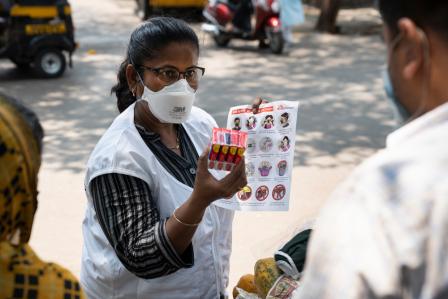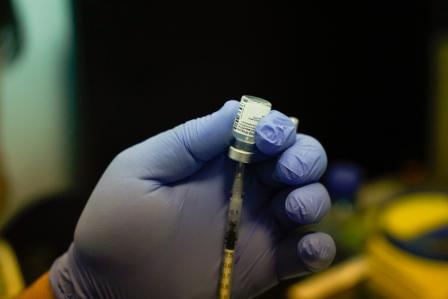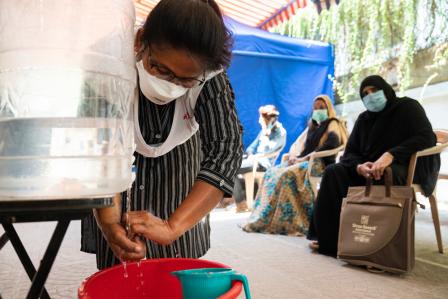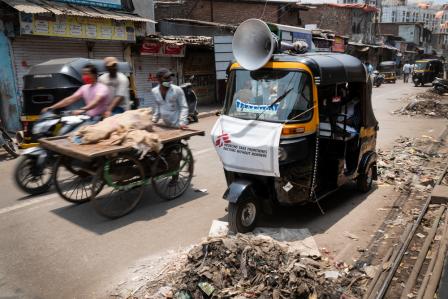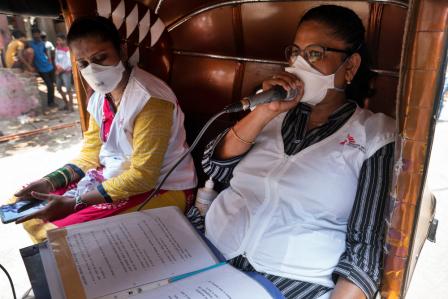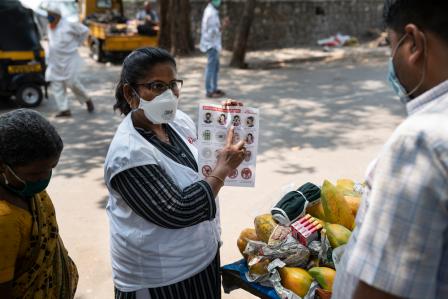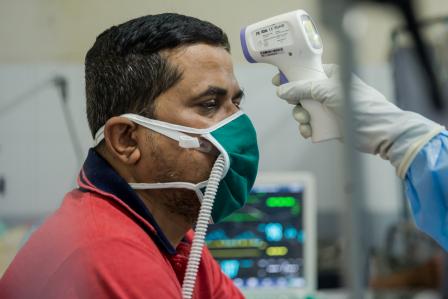COVID-19: Responding to India’s second wave
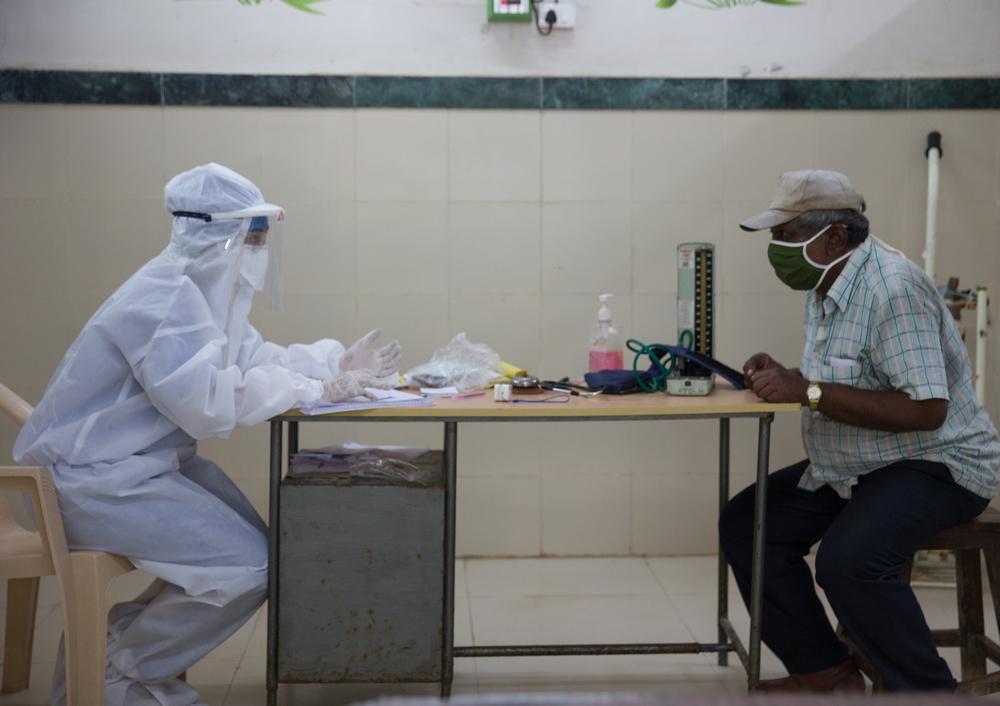
Medical doctor Dr Sharanya Ramakrishna checking a patient in the consultation room of Designated COVID-19 health centre at Pandit Madan Mohan Malviya Shatabdi hospital located in Govandi M East ward Mumbai. Photo from 2020. © Abhinav Chatterjee/MSF
The city is very densely populated and the poor and dilapidated hygiene conditions are a triple trigger for the virus to breed, infect and spread rapidly.
Daily new infections across the country have reached a peak of over 200,000 in a single day, with a whopping 115.736 new cases reported in Maharashtra state on a single day on 16 April.
“The situation is very worrying,” says Dilip Bhaskaran, COVID-19 Coordinator for Doctors Without Borders in Mumbai. “This is the largest upsurge since the pandemic started. “MSF stands ready to further pace up its services in support of the health facilities that are currently completely overwhelmed.”
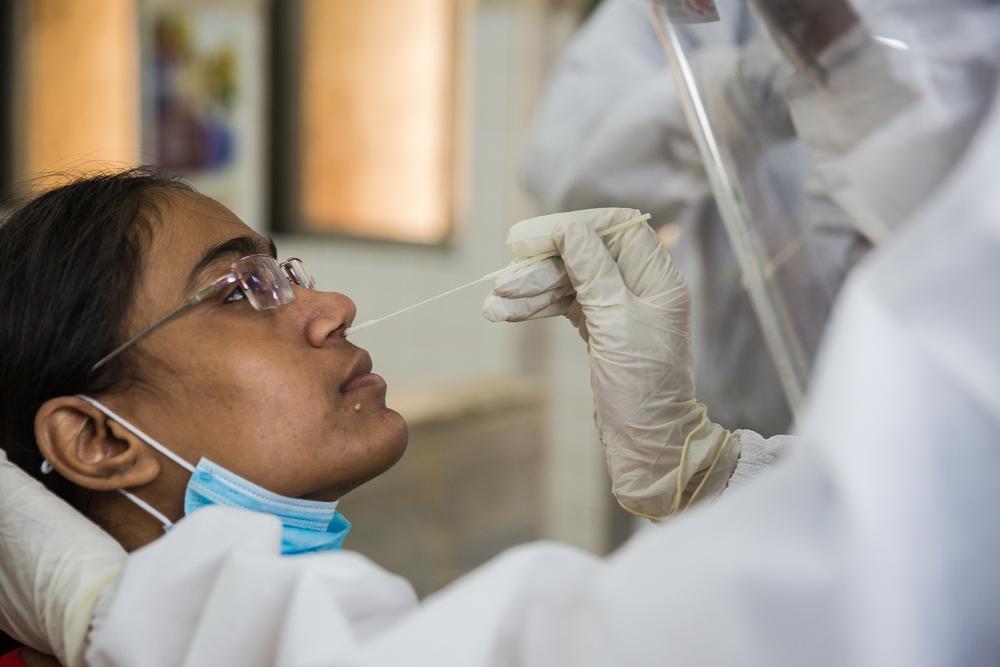
A medical doctor takes a swab sample at sample collection area of Designated COVID-19 health centre at Pandit Madan Mohan Malviya Shatabdi hospital located in Govandi M East ward Mumbai. Photo from 2020. © Abhinav Chatterjee
Meanwhile, our teams are actively identifying cases, conducting screening and appropriate triage for infection prevention and control for TB/DR-TB patients at Shatabdi hospital and the Doctors Without Borders independent clinic. Patients coinfected with COVID-19 and tuberculosis are being referred for inpatient management and treatment to Sewri hospital.
Non-TB identified patients with COVID-19 that need admission are referred to Dedicated COVID-19 Health Centre (DCHC) facilities.
Doctors Without Borders is further providing prevention kits, counseling and phone follow-up to high risk patients, including TB/DR-TB, Diabetes melitus patients and the elderly. To ensure continuity of care, Doctors Without Borders continues to support four health centers in MEW.
As of Saturday, April 17, Doctors Without Borders started shielding, digital health promotion, water and sanitation activities in the M-East Ward (MEW) of Mumbai. Activities will be further extended to five more health facilities.
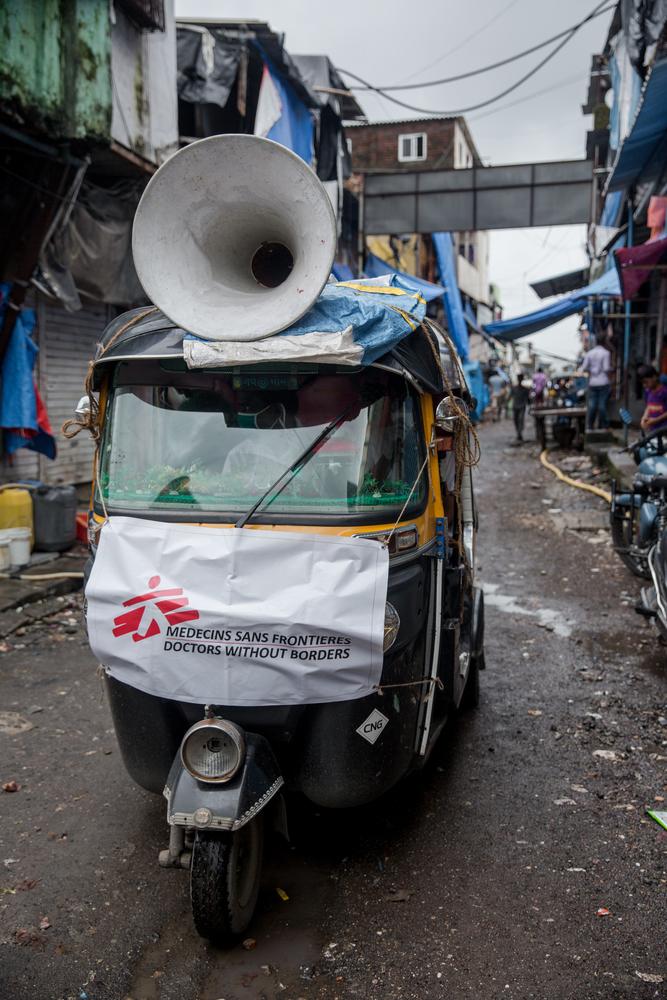
Health promotion activities conducted by MSF in Govandi slums in Mumbai, in order to prevent the spread of COVID-19. Photo from 2020. © Abhinav Chatterjee/MSF
- COVID has changed me as a person and as a doctor.
Picture a thousand-bed hospital. There are 28 wards, as well as the emergency, casualty and triage areas. It’s a makeshift hospital in a huge metal tent. Walking into it the first time was a surreal experience; I’ve never seen anything like it. It’s like walking into a huge ship. The ceiling is really high, but the ventilation is not great. It meets some standards, but it doesn’t really suit the Mumbai environment. During the morning, Mumbai becomes very humid. It’s excruciatingly hot. And working in a protective suit for six hours; it’s unimaginable. The heat is almost too much to take.
This is the second week of our emergency project. Last week, we had about 200 to 250 new patients admitted every day and, while the situation in Mumbai remains very serious, as a team, we have had a better week. This week we’ve seen improving results from our patients, better than we expected.
When I first began working at the Mumbai COVID centre in September 2020 it was chaos, with waves and waves of scared people coming in every day. After that, things smoothed out; patient care smoothed out.
Today, our greatest challenge is attrition of staff. People just cannot work in this environment for long periods of time. It’s burn-out, and the burn-out cycles are faster now than in the first wave. Right now, it’s three days and you’re burned out. Even if your shift is only six hours, those are COVID hours. It’s the conditions, the sheer number of patients and the lack of proper induction. There are 28 wards; each ward should have two nurses present per shift and there are four shifts. You do the math and you can see – it’s hard to find that many nurses.
We are focused on recruiting and training new staff. Many of the Ministry of Health nurses we work with are fresh graduates who’ve been thrust into something that nobody really expected or can really fathom. They’re trying get the job done, but they’re inexperienced and don’t know how to manage their work or their time. Our Doctors Without Borders nurses are supporting MOH nurses with mentorship and coaching at the patient’s bedside.
COVID has changed me as a person and as a doctor. People are dying, but I’ve become used to it. We have come to terms with it. I’ve not had the time to reflect on them. I used to be very patient-centred, all about patient advocacy. Now, I’m scared of building relationships with patients. At first I did that, and then I would come back for my next shift and see their empty bed, and that would break my heart. Even the fact that I now refer them as ‘the patient’. I would have used a name before. Or I would say, ‘my patient’. This is how it’s changed me.
We have come up with intuitive ways to make the work easier on our staff. The Doctors Without Borders team is full of really strong personalities. This is what I look for when I recruit them. Each member of our team is really strong, both their clinical skills and their personality. We’re encouraging our staff to start conversations early on their patient about the possible eventualities of COVID, to help both staff and patients understand what might happen; the possibility of their death. We’ve had positive results from this. It’s helped our team accept what happens to their patients. Not just that they’ve had the conversation, but that the patient knew what was going to happen, and was in some way prepared for it.
Everyone must speak out about the situation in India. What’s happening now is an atrocity and if no one was talking about it, it would just happen. It would be a single tree that fell in a forest clearing. India has plenty of people ready to volunteer however they can and plenty of people who want to receive medical care if they can. The gaps are in the infrastructure.
It’s kind of ebbed at the moment, but it feels like the calm before the storm. There is a fear that Mumbai might go into a complete lockdown. We are really working overtime to put things in place before anything worse happens. If it doesn’t happen, great; COVID is a context where I love to be wrong!
What’s happening now is an atrocity.
Gautam Harigovind is the Medical Activity Manager of the Doctors Without Borders COVID-19 project in Mumbai. He describes their work here.
Doctors Without Borders is preparing to support two units within a Jumbo hospital in Mumbai. The divisions will include two set of tents with about 1000 intensive care unit bed capacity in each. Five additional medical doctors and five nurses have been recruited to strengthen the response.
Doctors Without Borders will continue to provide medical and technical support with oxygen supplies and therapy.
